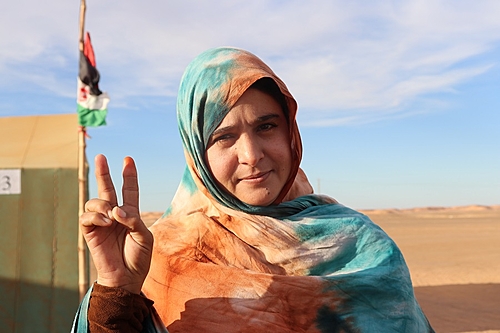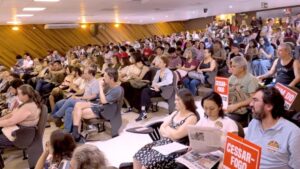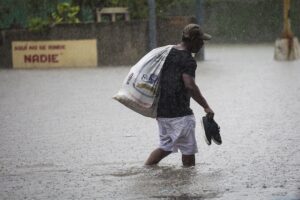
This February 18th, Sahrawi Women’s Day is celebrated, a date established to reinforce the role of women in the struggle for independence in Western Sahara. This organization comes from afar. The National Union of Sahrawi Women (UNMS) was created in 1974, just one year after the founding of the Polisario Front, which unified all Sahrawi grassroots organizations to fight for independence from Spain.
Since then, the UNMS has held its own congresses, elected a general secretary and ten directors who deal with specific areas, including: reproductive health, human rights, territory, information and microcredit.
:: The struggle of women in Western Sahara: an activist tells the story of a people under occupation ::
“There are several departments for the Union to be able to work with its base at national and local level”, explains the secretary general of the Union of Sahrawi Women, Chaba Seini.
“We have already spent many years between war and peace, so we need to inform women and prepare them at all levels: political, social and economic”, she adds.
Chaba Seini is secretary general of the National Union of Sahrawi Women / Michele de Mello / Brasil de Fato
History
In 1975, after defeating the Spanish monarchy, the Saharawis began to resist the invasion of the kingdom of Rabat. The Green March was an armed invasion of 350,000 civilians and soldiers sent by King Hassan II to take Western Sahara.
During more than 30 years of war against Morocco, it was women who built the Wilayas (cities) in refugee camps, building buildings and organizing local government.
Today there are around 260,000 Sahrawis living in five camps in the city of Tindouf, Algeria. Each Wilaya is named after a town that exists in Western Sahara: Dajla, Auserd, Aaiun, Bujador and Smara.
“We are the base. We have the responsibility to organize ourselves at the base, but also for the armed struggle. front whenever necessary”, comments Chaba Seini.
In the first years of war and life in exile it was the Sahrawi women who taught the children language, mathematics and general knowledge. People who had higher education wrote the pedagogical books used in the classroom until the Sahrawis began to receive support from multilateral organizations.
Watch Video | “Return to armed struggle was forced by Moroccan army” says Sahrawi minister on war
Despite having schools, shops and hospitals in all the Wilayas, Sahrawi children must travel to other major cities in Algeria or abroad to study a degree or technical specialization.

Women made up the majority of the delegation elected at the last Congress of the Polisario Front, held in January of this year in Algeria / Michele de Mello / Brasil de Fato
The restrictions of life in a refugee situation, such as the absence of universities, are the main factors that lead Sahrawi women to leave their Wilayas.
But there are also those who emigrate to study and decide to return to their homeland. Bouba Mohamed Ali is from the generation of women who were born in exile, studied in Spain and ended up returning to Dajala to take over as a Spanish teacher at the primary school.
“I chose this profession to help my people, the children of my people. I can also help any country that needs our help, but first I want to help my people. I hope we have our independence to be able to help other refugee peoples, as we are today,” he says.
Although Chaba and Bouba belong to different generations, their commitment to the liberation of their people is the same.
“Our desire is to live like other women in any part of the world, who can live in freedom in their countries, in their land, and we cannot. Those who do not have their independence have nothing”, says Bouba Mohamed Ali.
Editing: Patricia de Matos
Source: www.brasildefato.com.br

